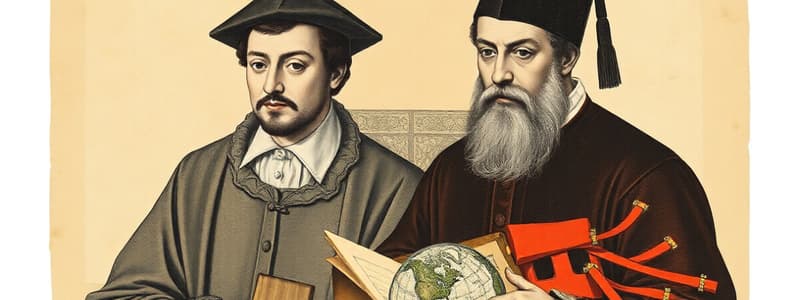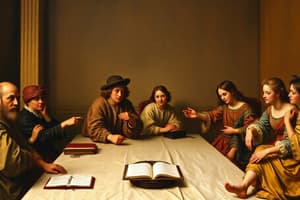Podcast
Questions and Answers
What was Sir Thomas More's stance on punishment in education?
What was Sir Thomas More's stance on punishment in education?
- He advocated for a more balanced approach, incorporating both punishment and reward.
- He encouraged parents and teachers to use punishment sparingly, focusing on rewards and positive reinforcement. (correct)
- He felt that punishment was a waste of time and should be replaced with more productive methods.
- He believed that punishment was necessary to motivate children.
According to Sir Thomas More, what was the key to effective learning?
According to Sir Thomas More, what was the key to effective learning?
- The use of punishment to deter undesirable behaviors.
- Strict discipline and adherence to a structured curriculum.
- Encouraging competition and a desire to excel among students.
- Making the subject matter enjoyable and engaging for children. (correct)
What was Desiderius Erasmus's stance on women's education?
What was Desiderius Erasmus's stance on women's education?
- He believed that women's education should be limited to domestic skills.
- He was an advocate for higher education for women. (correct)
- He argued that women's education should be focused on religious studies.
- He thought both genders should have equal access to education.
Which of the following BEST represents the educational philosophy of the Renaissance figures mentioned?
Which of the following BEST represents the educational philosophy of the Renaissance figures mentioned?
Which Renaissance figure is credited with advocating for a more child-centered approach to education?
Which Renaissance figure is credited with advocating for a more child-centered approach to education?
Which of the following educational practices aligns with the Renaissance philosophy of Sir Thomas More and Desiderius Erasmus?
Which of the following educational practices aligns with the Renaissance philosophy of Sir Thomas More and Desiderius Erasmus?
What was the main objective of education during the Renaissance, as exemplified by the work of More and Erasmus?
What was the main objective of education during the Renaissance, as exemplified by the work of More and Erasmus?
How did the Renaissance education movement differ from traditional approaches?
How did the Renaissance education movement differ from traditional approaches?
What was a key impact of the Renaissance on education?
What was a key impact of the Renaissance on education?
What role did the invention of the printing press play in the Renaissance?
What role did the invention of the printing press play in the Renaissance?
What was a central goal of humanist education during the Renaissance?
What was a central goal of humanist education during the Renaissance?
Which of the following is NOT a characteristic of humanist education during the Renaissance?
Which of the following is NOT a characteristic of humanist education during the Renaissance?
Which of these best describes the impact of the Renaissance on Western education?
Which of these best describes the impact of the Renaissance on Western education?
How did the Renaissance influence the development of educational institutions?
How did the Renaissance influence the development of educational institutions?
Which of the following was NOT a major influence on Western Education during the Renaissance?
Which of the following was NOT a major influence on Western Education during the Renaissance?
Which of these is NOT a characteristic of how the Renaissance impacted education?
Which of these is NOT a characteristic of how the Renaissance impacted education?
Which of the following individuals was NOT a prominent figure during the Renaissance period?
Which of the following individuals was NOT a prominent figure during the Renaissance period?
What was a major characteristic of education during the Renaissance?
What was a major characteristic of education during the Renaissance?
Which of the following individuals is credited with introducing the concept of "tabula rasa"?
Which of the following individuals is credited with introducing the concept of "tabula rasa"?
What was one of the key principles advocated by John Amos Comenius in his approach to education?
What was one of the key principles advocated by John Amos Comenius in his approach to education?
Which of the following was NOT a significant development during the Renaissance period?
Which of the following was NOT a significant development during the Renaissance period?
What was a central theme of the Enlightenment era, impacting education during this time?
What was a central theme of the Enlightenment era, impacting education during this time?
Which of the following historical figures influenced the development of "progressive" educational ideals in the United States and Europe?
Which of the following historical figures influenced the development of "progressive" educational ideals in the United States and Europe?
Johann Pestalozzi's educational philosophy focused on the balance of "Head, Hands, and Heart." What did "Hands" represent in this concept?
Johann Pestalozzi's educational philosophy focused on the balance of "Head, Hands, and Heart." What did "Hands" represent in this concept?
Flashcards
Civic Responsibility in Rome
Civic Responsibility in Rome
Education aimed at training individuals for republican and imperial duties, focusing on military and administrative skills.
Arabic Education Focus
Arabic Education Focus
Education in Arabic cultures emphasized religious commitment and expertise in math, science, and medicine.
Purpose of Medieval Education
Purpose of Medieval Education
Education aimed to instill religious knowledge, social order, and prepare individuals for roles in society.
Aristotle's View on Education
Aristotle's View on Education
Signup and view all the flashcards
Human Beings Defined by Aristotle
Human Beings Defined by Aristotle
Signup and view all the flashcards
Thomas More's Educational Philosophy
Thomas More's Educational Philosophy
Signup and view all the flashcards
Erasmus and Women's Education
Erasmus and Women's Education
Signup and view all the flashcards
Impact of Renaissance on Education
Impact of Renaissance on Education
Signup and view all the flashcards
Humanism
Humanism
Signup and view all the flashcards
Gutenberg Printing Press
Gutenberg Printing Press
Signup and view all the flashcards
Renaissance Education Goals
Renaissance Education Goals
Signup and view all the flashcards
Reformation Education Goals
Reformation Education Goals
Signup and view all the flashcards
Classical Humanist Educators
Classical Humanist Educators
Signup and view all the flashcards
Universal Education
Universal Education
Signup and view all the flashcards
Martin Luther
Martin Luther
Signup and view all the flashcards
Vernacular Elementary Schools
Vernacular Elementary Schools
Signup and view all the flashcards
John Amos Comenius
John Amos Comenius
Signup and view all the flashcards
Tabula Rasa
Tabula Rasa
Signup and view all the flashcards
John Locke's Philosophy
John Locke's Philosophy
Signup and view all the flashcards
Natural Growth Process
Natural Growth Process
Signup and view all the flashcards
Jean Jacques Rousseau
Jean Jacques Rousseau
Signup and view all the flashcards
Progressive Education
Progressive Education
Signup and view all the flashcards
Head - Hands - Heart
Head - Hands - Heart
Signup and view all the flashcards
Importance of Nurture
Importance of Nurture
Signup and view all the flashcards
Study Notes
Early Childhood Education Theories in History
- Early childhood education theories trace historical development, focusing on philosophies and approaches.
- Education, as an institution, was created to ensure societal stability and survival.
- Dewey believed that school's role is to cultivate the spirit of service and effective self-direction in children, fostering a worthy, harmonious, and lovely society.
- Brinkerhoff (1989) defined socialization as the process of learning roles, statuses, and values for societal participation and anticipatory socialization as role learning for future responsibilities.
- Schools are considered important agents of socialization, tasked with imparting knowledge and skills essential for societal functioning and transmitting cultural values.
- Primitive societies' educational goals focused on security, conformity to group morals, and the preservation of traditions, such as language.
- Ancient Greece and Rome emphasized excellence in body, mind, and spirit, reflected in Olympic competitions, arts, and philosophical writings like Plato's Republic. Early education and nursery schools were established.
- The Greek period (1600 BC - 300 BC) focused on civic responsibility and identity within the city state, with Athenian ideals of well-rounded development and Spartan emphasis on military leaders and soldiers.
- The Roman period (750 BC - AD 450) emphasized civic responsibility for the republic and empire, with a focus on military and administrative skills.
- The Arabic influence introduced reading, writing, mathematics, religious literature, and scientific studies. Medieval focus on religious commitment, knowledge, and ritual to establish social order.
- Aristotle, Plato's pupil, believed all children deserved education that focuses on cultivating habits.
Renaissance
- Erasmus and More advocated education of women and away from church dogma, toward humanism and ancient literature. They encouraged avoiding harsh punishments and finding stimulating learning methods.
- The invention of the printing press made books more accessible during the Renaissance.
Reformation
- Martin Luther advocated for universal education for boys and girls.
- Religious societies emerged to educate orphans and marginalized children.
- John Amos Comenius, a Bohemian monk, developed new teaching methodologies and produced some of the earliest materials for early childhood education.
The Enlightenment
- A new emphasis emerged on the potential of humankind to understand the universe and transform society. Enlightenment thinkers aimed to make education more practical and scientific, moving away from religious dogma.
John Locke
- He advocated for a blank slate philosophy (tabula rasa), believing knowledge originates from sensory experience, not inherent factors.
- Locke emphasized the importance of nurturing over inherent goodness and believed in gentler discipline methods over corporal punishments.
Jean-Jacques Rousseau
- He believed that children are born with a natural goodness that flourishes when shielded from the corrupting influences of society.
- Rousseau emphasized the importance of direct experiences, natural environments, and undirected play for learning and development.
Johann Pestalozzi
- Influenced by Rousseau, Pestalozzi emphasized the development of the whole child (head, hands, and heart).
- He believed in child's right to education and education's potential for social reform.
- Pestalozzi rejected rote memorization and advocated for hands-on experiences and exploration as a basis for learning.
Robert Owen
- This Welsh industrialist abolished child labor in his textile mills and established schools to improve children's lives.
- Owen advocated for a society based on mutual consideration, emphasizing sensory learning through interactions, activities like dancing, nature study, and play.
Friedrich Froebel
- Froebel founded the first kindergarten in Germany in 1837.
- He believed in children's innate goodness and potential for development, viewing play, toys, and songs as essential learning tools.
- Froebel’s gift and occupations materials, structured though open-ended, were designed for different sensory and intellectual objectives during play.
Elizabeth Peabody
- Peabody studied with Froebel and introduced the kindergarten concept to the Anglosphere, founding the first English speaking kindergarten in Boston.
The Nursery School
- The nursery school, established by the McMillan sisters, focused on nurturing and educating young children, emphasizing play, outdoor activities, and the importance of healthy development.
- These schools catered to poor families who needed extra support beyond the typical care, such as in health and nutrition.
Bank Street College of Education
- Bank Street College of Education focused on developing the whole child; they believed children are unique and learn through play and interactions with others in a socially democratic environment.
Montessori Approach/Method
- Maria Montessori, an Italian physician, founded the Casa dei Bambini (Children's Houses).
- Montessori believed in the child's innate intelligence, believing their intelligence develops through sensory experiences.
- Teachers' role is one of observation and support; children seek out learning and develop autonomy in a well-structured environment.
John Dewey
- Dewey, a philosopher and educator, believed that education should actively engage children in the present society.
- He advocated for progressive education, emphasized children's social and civic responsibilities, and implemented the theories in his education practices.
Studying That Suits You
Use AI to generate personalized quizzes and flashcards to suit your learning preferences.




